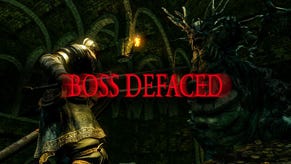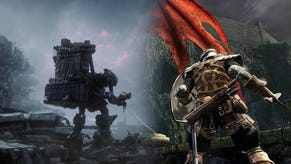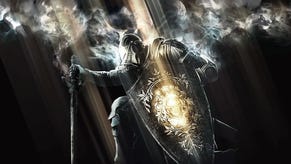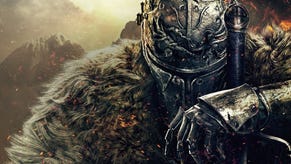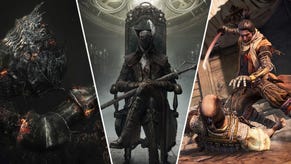Passionate psychopaths: Dark Souls debuts in Dubai
Proud publisher Namco Bandai shows off Dark Souls in motion for the first time in Dubai. Impressions, quotes, new screens.
As the sequel to a game that made its way all the way across the world just because nobody could shut up about how good it was, Dark Souls has a lot to live up to. But of course, it's not nominally a sequel – just spiritually, aesthetically and in every other aspect you could care to name. The wonderful news for Demon's Souls' many devotees is that it looks like things have barely changed at all.
FROM Software has been pretty clear about wanting to make Dark Souls even more difficult than its famously punishing predecessor. But harder doesn't mean less fair – it never has meant that. The studio's approach to difficulty is mischievous; Dark Souls wants you to outwit it. As we're taken through a wonderfully gloomy castle that our demonstrator playfully refers to as Trap Theme-Park in the game's first ever gameplay demonstration, nobody in the room can suppress their laughter at the sheer ingenuity with which it constantly tries to kill you.
The castle, constructed in a grimly beautiful medieval-European style, is all winding, dark corridors and precarious stretches of bridge reaching out over gaping, deadly chasms. Pendulous blades swing back and forth across each span, and arrow traps shoot death from the walls if you accidentally step on a plate. Everything in the world is designed to murder you as efficiently as possible.
The fiends that dwell at the end of every corner are appropriately terrifying, especially when all you can see is their red eyes at the end of a dark corridor. Four-armed snake-headed guards leap at you from improbable distances, a glinting flamberge in each of their four hands. Butchers hack at tables with gigantic cleavers before slowly turning their gaze to you. The horror aspect of Demon's Souls was one of its most insidious and memorable personality traits, and it comes across strongly in Dark Souls too, creating a fascinating contrast and tension between its relentlessly dark aesthetic and the unexpected wit and playfulness of its deadly scenarios.
Kei Hirono, Producer at Namco Bandai Games International, has worked closely with FROM on Dark Souls – the publisher seems to have taken an active role in its development, but it hasn't encroached on the developer's way of doing things, or forced compromise upon the game.
Crucial details about the evolution of that uniquely forward-thinking, double-edged online functionality are being held back until E3. The idea in Demon's Souls was that any player could be your friend or your enemy, a unique ethos that Hirono claims is being preserved – but he also hints at an expansion of the system that somehow determines the role that you'll play in Dark Souls' world.
“Absolutely yes, that's a feature that's being preserved. The anonymous multiplayer was very important to Demon's Souls and it will be carried over,” he says. “What we really want to emphasise is the amount of role-playing that is available. We've implemented a system – we're not sure what we're going to call it yet – but it's sort of a pledge or a contract that will help to determine what the role of the player is in the Dark Souls world, and that in turn will help determine whether you want to be an enemy to other players, or become an ally. So it has been carried over and added onto.”
A question of balance
Another of Demon's Souls most exquisite qualities was its balance; despite its difficulty, you didn't have to be the world's best gamer in order to make your way through. The brave and masochistic could snatch improbable victories from the game's cruellest scenarios, hacking away at a fifty-foot knight's heels with a sabre until it came crashing down, but the less confident could always collect souls and improve their magic and equipment by retreading old ground until the odds were more evenly stacked.
In this way, Demon's Souls didn't close itself off to anyone without a track record in impossible games. And despite that increased difficulty, Dark Souls won't close itself off either, claims Hirono. That difficulty is more about the design of the environments, the deviousness of the traps that it sets for you, than actual player skill.
“When we tune this game, although we want to make sure it's difficult, it doesn't depend on the actual technique of the players too heavily – people with faster reflexes won't necessarily be better at the game,” he says.
"People with faster reflexes won't necessarily be better at the game."
“In terms of customisation and role play, the weapons, items and magic that you can use has actually doubled the amount of options people have to customise and carry out their own play style. It won't depend on technique. There will always be options, as long as the player is patient and wants to challenge themselves.”
Dark Souls, then, is a game about what you have rather than what you are – about how you can turn the world's traps and design against it based on using what you find, be that a superb sword you take from a dead body, a technique you steal from a smart enemy or an enormous trap you find in a dark castle.
Near the top of the structure, our demonstrator comes across a room full of gears that houses the mechanism propelling the giant boulders down the staircases. By finding out how it works and messing with the machine, he is able to change the route that those crushing stones take down to earth, opening up new avenues for exploration – if he's brave enough to pursue them.
I won't spoil the details of this particular level for you – there are other people who will be all too willing to do that for you – but Dark Souls has made its intentions very clear, and I could not be more excited about what it will eventually deliver. Games like this, designed by passionate, intelligent psychopaths and successful because of their idiosyncrasies rather than despite them, are a unique and beautiful thing in this world.




